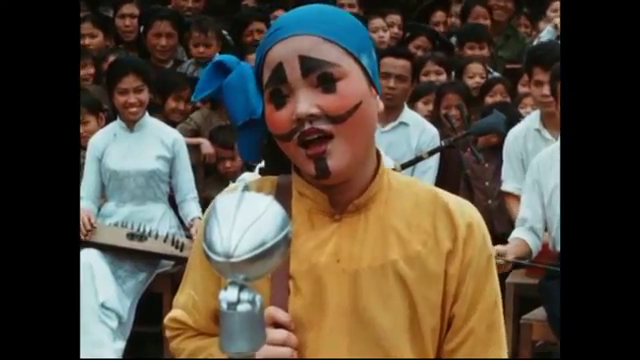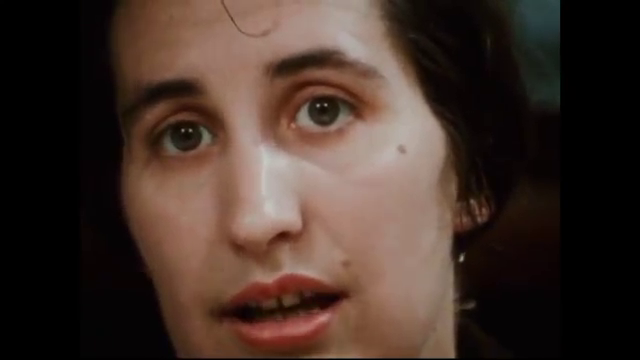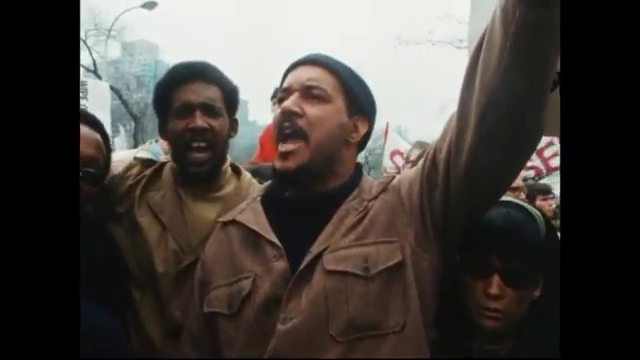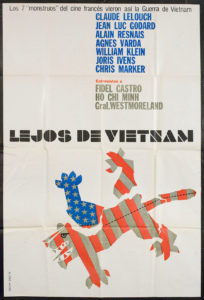|
Genres, Themes, Actors, and Directors:
- Alain Resnais Films
- Documentary
- Episodic Films
- French Films
- Godard Films
- Revolutionaries
- Vietnam War
Review:
French director-essayist “Chris Marker” spearheaded this collective effort (by himself, Joris Ivens, William Klein, Claude Lelouch, Agnès Varda, Jean-Luc Godard and Alain Resnais) to voice opposition to America’s involvement in Vietnam — and while some segments inevitably fare better than others, it remains surprisingly engaging and revelatory. Possibly the most emotional sequence shows the young widow of self-immolating Quaker protestor Norman Morrison calmly caring for her kids while visiting friends in Vietnam; (I honestly had no idea how many people have chosen this as a form of protest over the years.) On the flip side, Jean-Luc Godard’s segment is the most annoying; as DVD Savant writes, it features “a rambling verbal discourse with dull shots of himself pretending to operate a large film camera” as he “states that the best thing he can do is to lend his name to this movie” (!) since Hanoi refused to give him a travel visa. Ah, ego.
Not unexpectedly, the film was far from neutrally received in America. As DVD Savant notes in his review:
“When it was new Far from Vietnam mainly saw screenings at festivals and on college campuses, probably in so-so 16mm prints. Commercial bookings for anti-establishment pictures were difficult, due to vandalism and smoke bomb attacks by right-wing extremists. When they could, U.S. customs officials prohibited the import of ‘foreign propaganda’. The situation wasn’t all that different in France, where a theater showing Far from Vietnam was heavily damaged and its manager beaten by a mob of thugs.”
Even for viewers who have seen other documentaries or movies about the war, Far From Vietnam is well worth a look as an invaluable historical document.
Redeeming Qualities and Moments:
- Many powerful, memorable moments and sequences

 


Must See?
Yes, once, for its historical significance.
Categories
Links:
|






One thought on “Far From Vietnam (1967)”
First viewing – agreed; a once-must for its place in cinema history and in world history.
Overall, the film speaks (volumes) for itself.
Since the Godard section was pointed out in the assessment – I should add that I thought even Godard (surprisingly) managed a few bits of insight. (I’m not a Godard fan so that surprised me.) But what I found even more annoying than the bulk of his contribution are the various instances in which we’re shown the Americans who are “My country right or wrong” types. Not only is that type typically – almost maniacally – loud but its nature leans toward ugly and not very bright.
The perspectives presented in this doc may vary somewhat (given that each section has a different director) but there is a pronounced cohesion that more than suggests a unity of thought. One section that stands out for me is the one directed by Alain Resnais – in which actor Bernard Fresson takes on the personality of writer Claude Ridder as he relates an account of changing natures and loyalties in war (i.e., how America was seen as an almost beloved ally during WWII but how that image altered with the Vietnam war).
This is a documentary of crucial importance. In its final moments, there are closing remarks re: the ongoing battle between the rich and the poor (in other words, capitalists and basically everybody else) that are very potent.